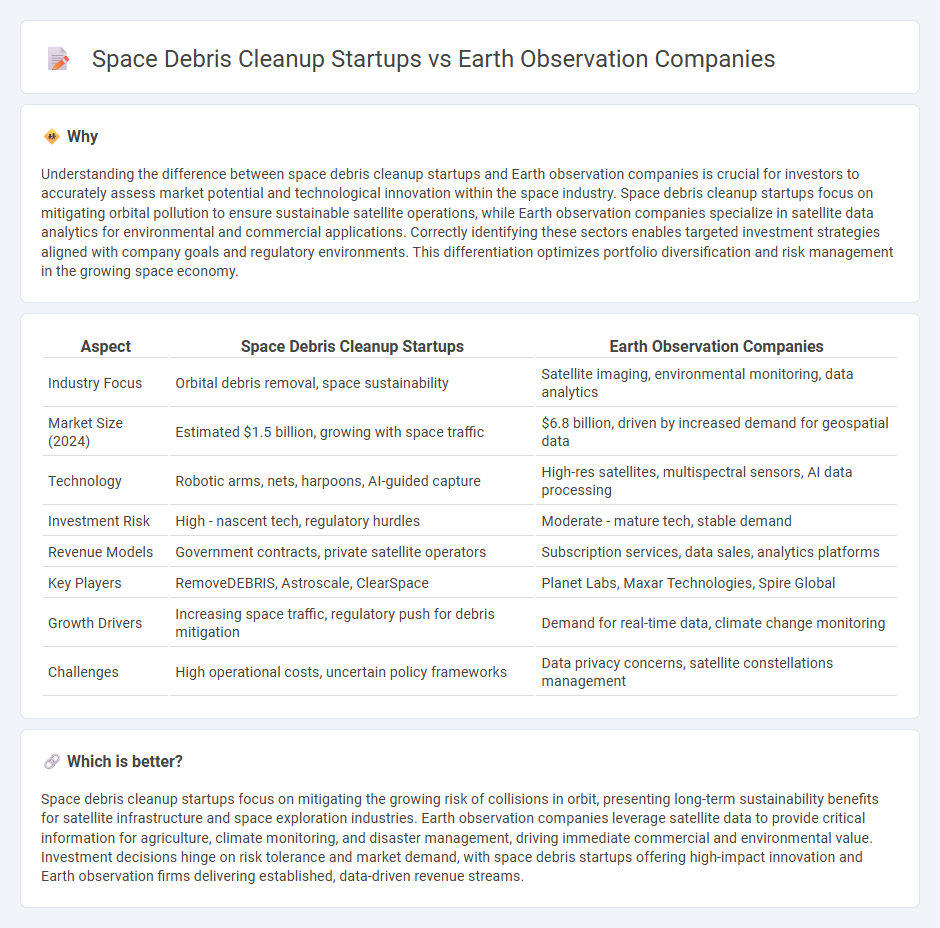
Space debris cleanup startups develop innovative technologies to remove hazardous orbital debris, enhancing satellite safety and preserving space environment sustainability. Earth observation companies specialize in collecting and analyzing satellite data to monitor environmental changes, support agriculture, and improve disaster response. Discover how these cutting-edge industries are shaping the future of space and Earth monitoring.
Why it is important
Understanding the difference between space debris cleanup startups and Earth observation companies is crucial for investors to accurately assess market potential and technological innovation within the space industry. Space debris cleanup startups focus on mitigating orbital pollution to ensure sustainable satellite operations, while Earth observation companies specialize in satellite data analytics for environmental and commercial applications. Correctly identifying these sectors enables targeted investment strategies aligned with company goals and regulatory environments. This differentiation optimizes portfolio diversification and risk management in the growing space economy.
Comparison Table
| Aspect | Space Debris Cleanup Startups | Earth Observation Companies |
|---|---|---|
| Industry Focus | Orbital debris removal, space sustainability | Satellite imaging, environmental monitoring, data analytics |
| Market Size (2024) | Estimated $1.5 billion, growing with space traffic | $6.8 billion, driven by increased demand for geospatial data |
| Technology | Robotic arms, nets, harpoons, AI-guided capture | High-res satellites, multispectral sensors, AI data processing |
| Investment Risk | High - nascent tech, regulatory hurdles | Moderate - mature tech, stable demand |
| Revenue Models | Government contracts, private satellite operators | Subscription services, data sales, analytics platforms |
| Key Players | RemoveDEBRIS, Astroscale, ClearSpace | Planet Labs, Maxar Technologies, Spire Global |
| Growth Drivers | Increasing space traffic, regulatory push for debris mitigation | Demand for real-time data, climate change monitoring |
| Challenges | High operational costs, uncertain policy frameworks | Data privacy concerns, satellite constellations management |
Which is better?
Space debris cleanup startups focus on mitigating the growing risk of collisions in orbit, presenting long-term sustainability benefits for satellite infrastructure and space exploration industries. Earth observation companies leverage satellite data to provide critical information for agriculture, climate monitoring, and disaster management, driving immediate commercial and environmental value. Investment decisions hinge on risk tolerance and market demand, with space debris startups offering high-impact innovation and Earth observation firms delivering established, data-driven revenue streams.
Connection
Space debris cleanup startups and Earth observation companies are interconnected through their shared reliance on advanced satellite technologies and real-time data analytics to monitor and manage orbital environments. Earth observation companies provide critical imaging and tracking data that enable space debris startups to identify hazardous objects and optimize removal strategies. Collaborative efforts enhance space sustainability by reducing collision risks and preserving valuable satellite infrastructure.
Key Terms
**Earth observation companies:**
Earth observation companies specialize in collecting and analyzing satellite imagery to provide critical data for climate monitoring, agriculture, urban planning, and disaster management. Leading firms such as Maxar Technologies, Planet Labs, and ICEYE deploy advanced synthetic aperture radar and multispectral imaging to deliver high-resolution, real-time insights that enhance decision-making across industries. Discover how Earth observation innovations are transforming global data ecosystems and driving sustainable development.
Geospatial data
Earth observation companies harness satellite imagery to provide critical geospatial data for climate monitoring, urban planning, and disaster management, driving advancements in environmental analysis and infrastructure development. Space debris cleanup startups aim to mitigate orbital pollution through innovative technologies, preserving satellite functions and ensuring sustainable access to geospatial data. Explore how these sectors are transforming geospatial intelligence and contributing to space sustainability.
Remote sensing
Earth observation companies specialize in remote sensing technologies, utilizing satellites equipped with advanced sensors to capture high-resolution imagery for environmental monitoring, agricultural analysis, and disaster management. Space debris cleanup startups innovate in autonomous systems designed to detect, track, and remove defunct satellites and orbital debris, ensuring safer operating environments for remote sensing satellites. Explore more about how these sectors intersect to enhance satellite sustainability and data quality.
Source and External Links
Top Earth Observation Satellite Companies You Should Know - Includes key players like Planet Labs, Airbus, ICEYE, and Maxar that provide high-frequency satellite imagery and analytics services enabling real-time, detailed Earth monitoring across various industries.
DahnJ/EO-jobs: List of earth observation companies - A comprehensive list of earth observation firms such as Open Cosmos, Orbify, Orbital Eye, and Palantir focusing on satellites, data platforms, and analytics in the geospatial and climate sectors.
10 Earth Observation Companies to Watch [2025] - Highlights emerging startups like Bhusatyam Technologies, askEarth, Captis Space Systems, and Eartheye Space developing innovative satellite technologies and AI-driven Earth observation analytics.
 dowidth.com
dowidth.com